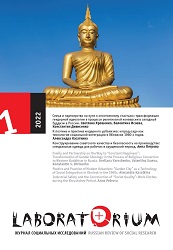Как развивалась доказательная медицина в России: от закрытых форумов к «доказательным» клиникам
How Evidence-Based Medicine Developed in Russia: From Internet Forums to Evidence-Based Clinics
Author(s): Oksana ParfenovaSubject(s): Welfare systems, Health and medicine and law
Published by: Центр независимых социологических исследований (ЦНСИ)
Keywords: Sociology of Medicine; Evidence-Based Medicine; Health Care System; Private Medicine; Intensive Motherhood; Self-Care; Millennials;
Summary/Abstract: The essay analyzes the transformation of the role and status of evidence-based medicine as a distinct phenomenon in the Russian context in the period from 2000 to 2021. Over these 20 years, evidence-based medicine, having gone from “the knowledge for the elite” to “a fashionable cliché,” has in fact become a brand, a marketing tool. Today, in the Russian-language mass media and on social media, expressions like “evidence-based clinic” and “evidence-based doctor” serve as a certain “mark of quality,” a brand. The increased popularity of social media has resulted in them becoming the main channel through which “evidence-based” doctors and clinics popularize medical knowledge, earn credibility, and find patients. I analyze this transformation of evidence-based medicine, in part, from the position of participant observation with elements of autoethnography. Assessing the ongoing changes from the perspective of a patient/client of medical services and specific doctors, I simultaneously reflect on them as an observer-researcher, drawing on external sources (expert statements, information from clinics’ websites, scholarship, publications in the media and social networks, etc.). The essay highlights three main factors that determined the trajectory of the development of evidence-based medicine: the marginal status of evidence-based medicine in the national healthcare system; institutional restructuring of the healthcare system in the post-Soviet period and the emergence of private medical care; generational change and the emergence of patients of the ”new formation.” The popularization of the principles of evidence-based medicine and their subsequent introduction into the practice of Russian private medical centers were accompanied not only by an improvement in the quality of diagnostics and treatment, but also by the birth of a patient of a “new formation”—not just a “demanding consumer” but a patient/consumer who is active, competent, willing to understand issues related to their own health and the health of their loved ones. The topic of personal health and health of loved ones is extremely sensitive, and we are dealing with a complex mix of negative experiences, a desire to control, fear, a sense of one’s own vulnerability, and, as a result, not only a desire but a clearly expressed need to trust the doctor and the medical system. In part, this problem can be solved by the concept of evidence-based medicine, aimed at ensuring the most effective interaction between the medical system and the patient. The widespread promotion of the principles of evidence-based medicine and the development of telemedicine can be seen as factors contributing to the reduction of inequality in access to quality medical services. Specialized social networks where reputable doctors recommend their colleagues and specific clinics help alleviate the problem of the devaluation of evidence-based medicine and its use as an advertising tool.
Journal: Laboratorium. Журнал социальных исследований
- Issue Year: 14/2022
- Issue No: 1
- Page Range: 111-132
- Page Count: 22
- Language: Russian

